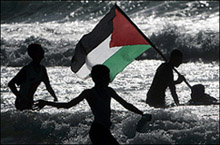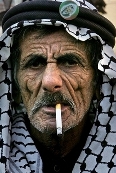
Several key questions have been lightly (and mistakenly) brushed aside and overshadowed by the fact that international political efforts and global media attention are increasingly shifting towards the socio-economic and political prospects of the Gaza Strip following Israel’s disengagement; “Gaza: the day after” has become the chorus line of most international observers/actors, Israelis, Arabs, and even Palestinians.
All have become obsessed with what will happen in Gaza following its “liberation” from Israel’s 38-year occupation: Will the Palestinians be able to get their act together and start reversing decades of damage and destruction caused by Israel’s military occupation of the Gaza Strip? Will Gaza mark the beginning of a coherent and sustainable process of Palestinian nation and institution-building, or will we fall victim, once again, to a familiar pattern of post-revolutionary systems tainted with corruption and the lack of will and ability to achieve real progress? Most importantly, are we on the brink of all-out factional confrontation in the Gaza Strip, and possibly civil war, or will we overcome this volatile element by sustaining a pragmatic and strategic dialogue among the various Palestinian political forces?
While these concerns are unquestionably legitimate and essential, there is an equally pressing need to assess the human suffering, institutional destruction, materialistic damage, and environmental degradation caused by 38 years of continuous Israeli military assaults against a predominantly unarmed civilian Palestinian population in Gaza. We need to assess the magnitude of Israel’s human rights violations against the Palestinian people in the Gaza Strip during the past 38 years, which exceed the most horrendous cases and scenarios elsewhere in the world (qualitatively and quantitatively): the pre-meditated killing and injury of Palestinian civilians by Israeli military forces and/or Jewish settlers, the extra-judicial killing (assassination) of Palestinian political figures, the demolition of Palestinian homes, the confiscation of Palestinian land, the construction of Jewish settlements on Palestinian land, the uprooting of Palestinian trees and the environmental damage caused by Israeli military measures and/or settlement construction, and the imprisonment, torture, and sometimes deportation of Palestinian civilians based on their political affiliations.
The policies of consecutive Israeli Governments in the Gaza Strip (and the West Bank) throughout the past 38 years have been a blatant and direct violation of international law, including the provisions of the 4th Geneva Convention of 1949 concerning the responsibility of the occupying power over the occupied population, UN Resolutions 242 and 338, the United Nations Universal Declaration of Human Rights, and the United Nations Charter (among other universally-adopted international legal agreements).
An accurate and comprehensive assessment of these violations would require a concerted effort of Palestinian institutions: governmental institutions, civil society organizations, and academic institutions and universities (as well as an advisory role by selected international human rights organizations). One cannot but stress the vitality of such an inquiry, not least for the history books and the education of future generations on the atrocities committed by Israel against the Palestinian people.
However, while this article does not claim to offer even a rough estimate of Israeli human rights violations in the Gaza Strip since 1967, it is worth outlining a selected set of facts and figures on the 2nd Intifada (Palestinian uprising against Israeli occupation) since 28 September 2000, in order to unveil a modest segment of Israel’s very busy (and brutal) human rights abuses record in the Occupied Palestinian territories.
The following statistics are based on a consolidation of both Palestinian and Israeli sources (outlined below):
1) Israeli military forces killed a total of 2,023 Palestinians in the Gaza Strip since 28 September 2000, including 425 children (under the age of 18), and 1,175 Palestinian youths (between the ages of 18 and 29). The majority of the victims are males (1,913), while the total number of females killed has reached 110, including 54 under the age of 18.
2) A total number of 8,603 Palestinians in the Gaza Strip have been injured by Israeli military attacks (shootings, shelling, and bystanders injured during assassinations) since 28 September 2000, 20% of whom are children under the age of 18. The total number of permanent disabilities due to these injuries is estimated at more than 1,200, including approximately 250 children under the age of 18.
3) The Israeli army demolished a total of 4,889 Palestinian homes in the Gaza Strip since the beginning the Intifada, 2,704 of which have been completely destroyed (leaving 24,768 people homeless), and 2,185 of which have been partially destroyed (leaving 25,211 people in poor and intolerable housing conditions).
4) Approximately 32 million square meters of Palestinian land in the Gaza Strip (mostly agricultural) was razed by Israeli army bulldozers (allegedly for “security” reasons), which represents at least 10% of the Gaza Strip’s arable land base. The vast majority of these areas have been utilized by Jewish settlers over the past 5 years.
5) Approximately 656 Palestinian businesses, factories, and schools have been either completely or partially destroyed by the Israeli army in the Gaza Strip during the past 5 years.
The horrifying fact that these figures reflect a mere 5-year period from Israel’s illegal 4-decade occupation of the Gaza Strip reinforces the need to launch a long term comprehensive inquiry. Turning a blind eye on the past and abandoning our basic right of questionability, accountability, and, ultimately, to compensation by the State of Israel would be a crime in itself.
Before rushing to “celebrate” among the ruins of the former Israeli settlements in the Gaza Strip, or at least while we are at it, we must contemplate how to mobilize our efforts (legal and otherwise) to hold Israel accountable for its crimes; we need to establish a Palestinian body whose responsibility would be to document and assess the past, and eventually take the lead in the inevitable process of putting Israel’s war criminals on trial.
It may be a while until the winds of change blow in our favour, but until that day comes, it is our collective obligation as Palestinians to ensure that our sons and daughters never forget.
Rami Bathish is director of the Media and Information Programme at the Palestinian Initiative for the Promotion of Global Dialogue and Democracy (MIFTAH). He can be contacted at mip@miftah.org
Sources:
1) The Palestinian Initiative for the Promotion of Global Dialogue and Democracy (MIFTAH) www.miftah.org
2) The Israeli Information Centre for Human Rights in the Occupied Territories (B'TSELEM) www.btselem.org
3) The Palestinian Central Bureau of Statistics (PCBS) www.pcbs.org
4) The Israeli Committee Against House Demolitions (ICAHD) www.icahd.org
5) The Palestinian Red Crescent Society (PRCS) www.palestinercs.org
6) The Palestinian Centre for Human Rights (PCHR) www.pchrgaza.org
7) The Palestine Monitor www.palestinemonitor.org
8) The Palestinian Environmental NGOs Network (PENGON) www.pengon.org










